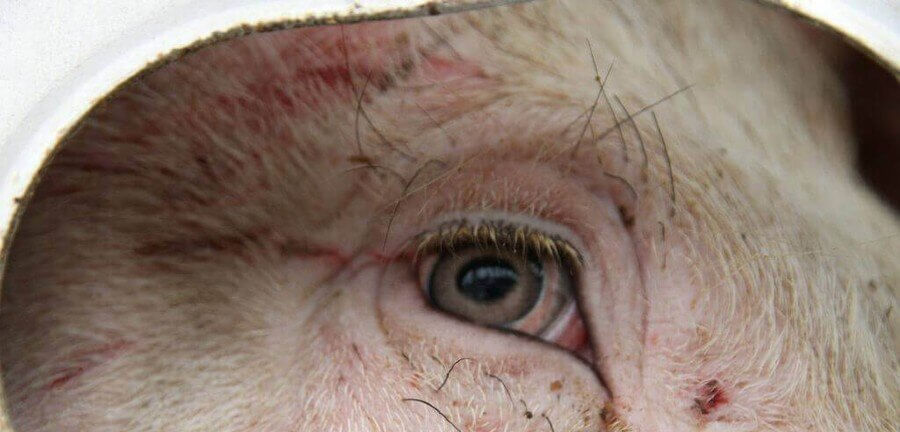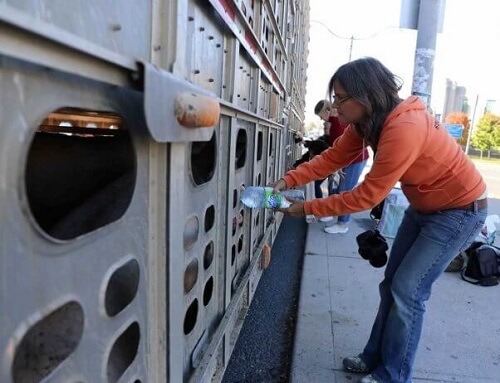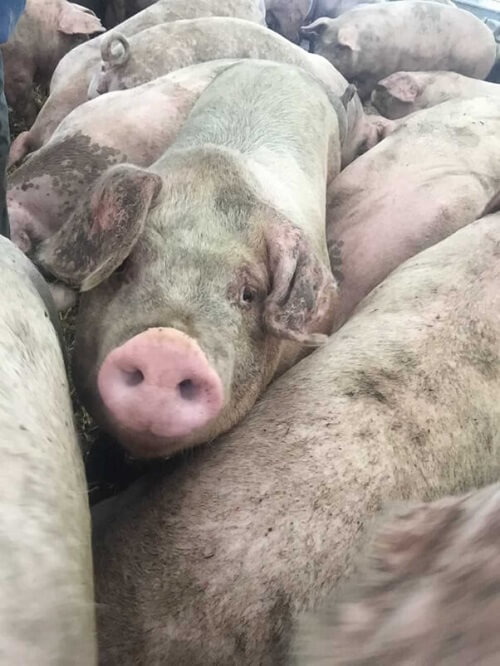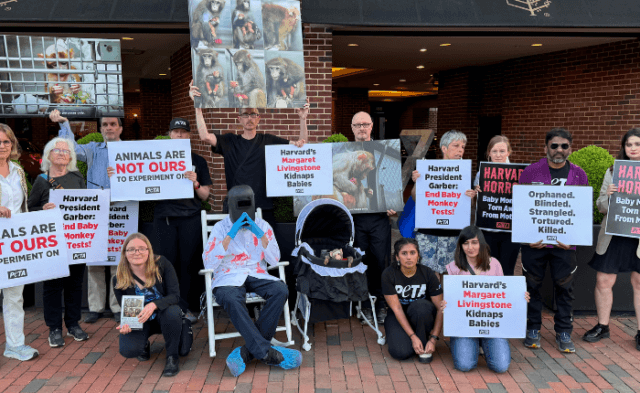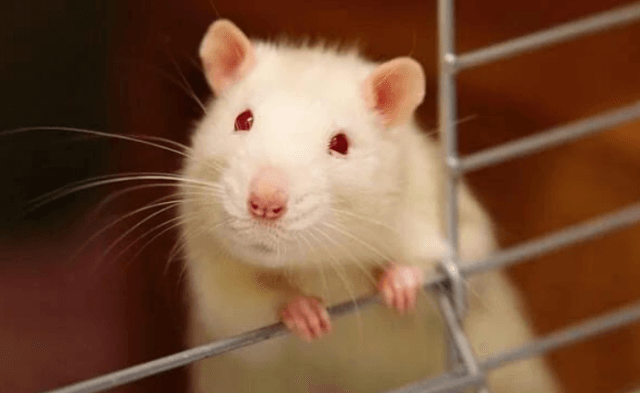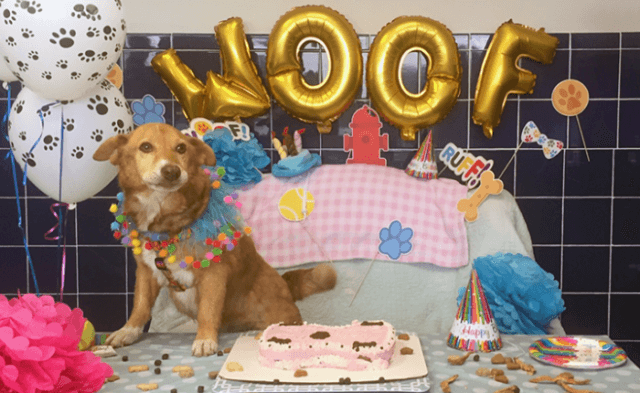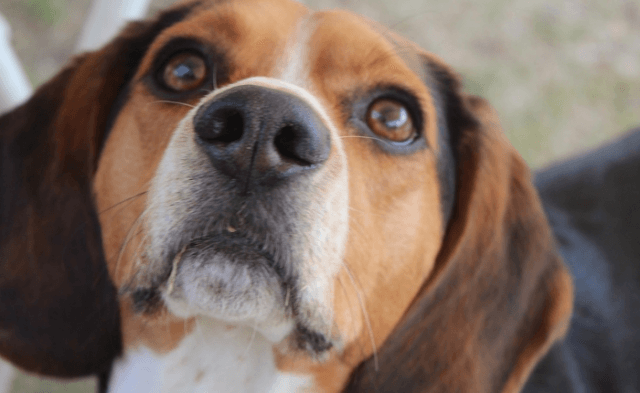On Thursday, May 4, at 6:20 a.m., I was on the road heading out to Halton Region in Ontario—home of Fearmans Pork Inc. slaughterhouse and the courthouse where Justice David A. Harris would decide whether Toronto Pig Save founder Anita Krajnc was guilty of mischief to property charges. Her offense? On the scorching-hot of June 22, 2015, she had offered bottled water to thirsty pigs in a transport truck on their way to the Fearmans slaughterhouse.
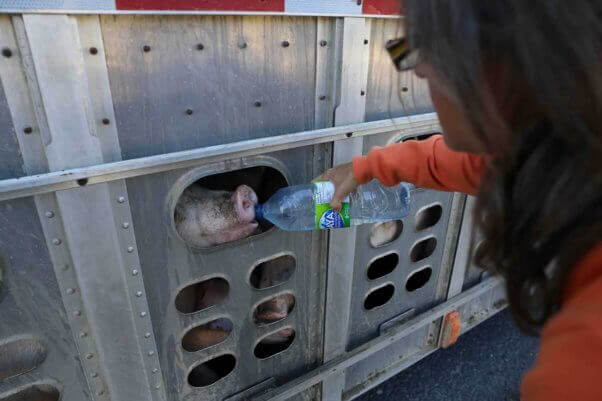
Photo by Elli Garlin
Specifically, she was accused of obstructing, interrupting, or interfering with the lawful use, enjoyment, or operation of property—namely, slaughter-bound pigs, most about 6 months old—belonging to the owner of Van Boekel Hog Farms.
Comforting these doomed young animals—visible and touchable through slots on the side of the truck as well as often curious about the humans reaching out to them—is part of the Pig Save movement’s mission to promote animal rights activism and bear witness to the suffering and condition of animals. The ultimate goal is to usher in a nonviolent vegan world.
But on that broiling June day, Van Boekel’s driver got down from his truck and confronted Anita. He also called Van Boekel, precipitating the events that brought scores of us into Judge Harris’ courtroom during the six days of Anita’s trial.
But even a court date didn’t stop Anita from witnessing. By 7:30 a.m., she and a legion of Pig Savers were outside Fearmans peacefully demonstrating their horror of meat-eating by holding signs decorated with the sad faces of pigs and pleas ranging from “We Are Only 6 Months Old” and “We Are Sentient Beings, Too” to “We Feel Fear, Too” and “Why Love the One and Eat the Other?” As trucks rolled up to Fearmans, the protesters called gently to the pigs and stroked their tender, outstretched snouts.
One demonstrator was 10-year-old Mckenna Grace—an American child actor who appears on the program Designated Survivor. She handed out homemade pink cardboard pigs with curly tails and clothespin legs.
An hour later, I was lucky enough to find a seat on a bench in the packed courtroom. As Judge Harris had done during the trial, he accommodated the overflow audience—consisting overwhelmingly of Anita’s supporters—by allowing them to sit on the floor if no seats were available and freeing up additional space by inviting media representatives to sit in what would normally be the prisoner’s box.
The judge began to read his 15-page verdict, ending with, “Case dismissed.” After six days of testimony, he was convinced that Anita had not willfully obstructed, interrupted, or interfered with the lawful use, enjoyment, or operation of “property,” as he referred to Van Boekel’s pigs. Clearly, she had simply offered water and not—as prosecution witnesses claimed to fear—a possible contaminant to the animals whose welfare she has made her life’s work.
The “Water to Thirsty Pigs Trial” was over, and Anita was free to go, once she had spoken to the pack of journalists on the courthouse lawn. Now what? I wondered. How would the verdict affect Pig Savers’ future activities?
All around me, animal activists were cheering Anita’s victory—but I didn’t join in, because the verdict stuck in my craw. Above all, I was bitter that the judge had rejected Anita’s expert witnesses’ opinion that pigs are persons rather than property. To me, the battle to win them the legal status of “persons”—to which corporations are already entitled—was at the heart of the trial. Obtaining that status would have been such a magnificent victory for animal rights, beginning with the right not to be slaughtered.
Yet despite reinforcing the legal status quo, the verdict has what James Silver—one of Anita’s pro bono lawyers—describes as “hugely important” implications. Carefully written to withstand any challenges in appeals court, Judge Harris’ decision makes it clear that Anita’s mission and the work of the Save Movement are perfectly legal. From now on, we can stand alongside Anita, witnessing and offering solace to pigs, without worrying about going to jail for it. Now where is that cardboard piglet that Mckenna Grace gave me? I’ll pin it on my lapel and join my fellow Pig Savers as they celebrate Anita’s victory.
***
Elizabeth Abbott is an award-winning author, a senior research associate at the University of Toronto’s Trinity College, a PETA supporter, a member of Toronto Pig Save. She was also an Animal Protection Party of Canada candidate in the 2015 federal elections. Her most recent book is Dogs and Underdogs: Finding Happiness at Both Ends of the Leash.

